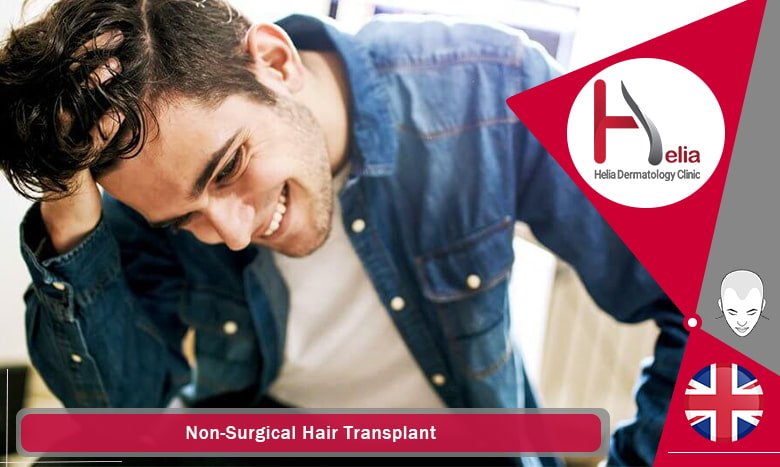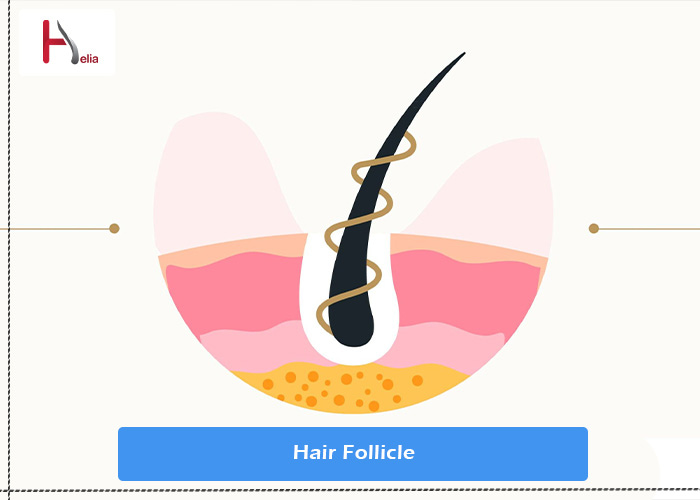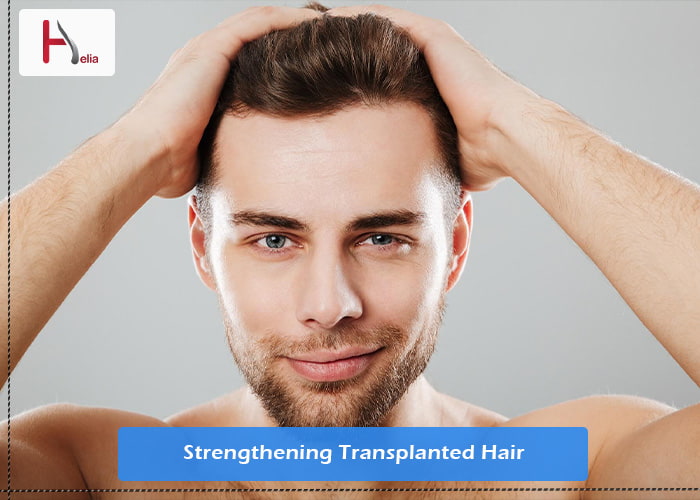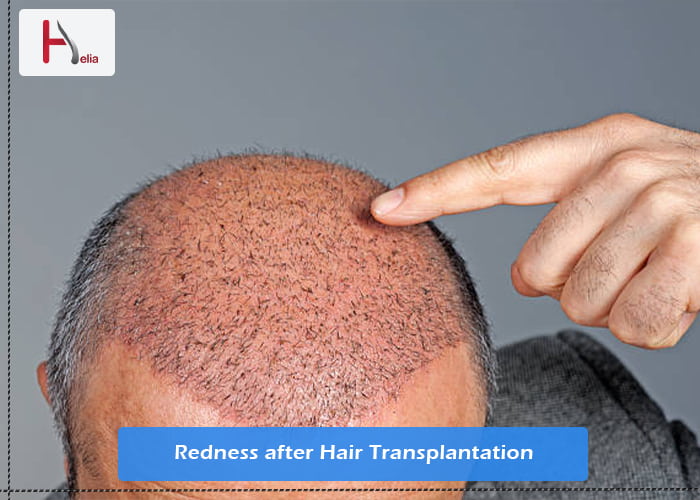In recent years, the lifestyle and nutrition have caused more and more people to suffer from hair loss and thinning hair. Because having healthy and beautiful hair, first of all, depends a lot on environmental factors and personal nutrition. Fortunately, advances in technology have led to several effective methods of treating this problem. One of these solutions that will get you to your desired hair more than any other method and with the least hassle is hair transplantation methods without surgery and bleeding. Non-surgical hair restoration is not just for a specific group of people and all those who complain of hair loss and baldness in the scalp can benefit from its significant advantages.
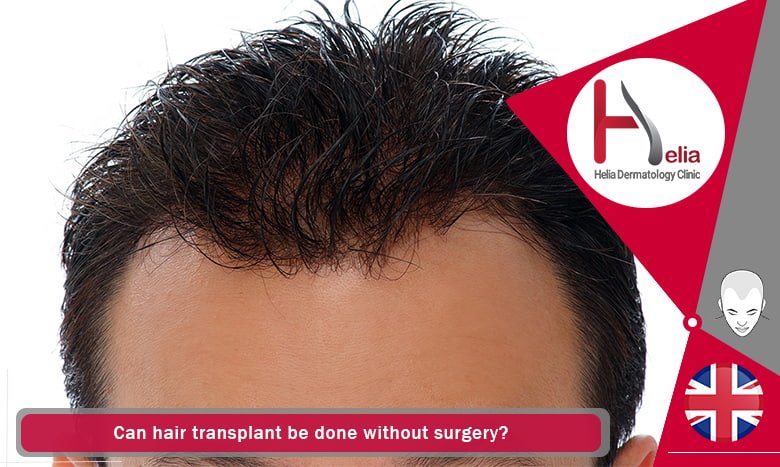
If you are also struggling with such a problem and you like to have thick hair, it is better to choose one of the hair transplant methods with the help of a specialist doctor and after performing the necessary examinations, enjoy the final result. Hair transplantation without surgery in Helia Dermatologic Clinic is performed by Dr. Khorasani with the latest technologies in the world. For more information on this topic, follow us in this article.
Most people consider hair transplantation surgery to be the only solution to the problem of hair loss and thinning hair, but is surgery the only solution available, or can this problem be solved without surgery? First, you need to know who needs a hair transplant. People with excessive hair loss, people undergoing chemotherapy or people with bald heads are the best hair transplant candidates.
non invasive hair transplant
Non-invasive hair transplants are a type of hair restoration procedure that does not involve surgery. Instead, these procedures use a variety of techniques to stimulate hair growth, such as laser therapy, microneedling, and PRP (platelet-rich plasma) therapy. These treatments are less invasive than traditional hair transplants, and they can be used to treat both male and female pattern baldness.
Is hair transplant surgery?
In general, hair transplantation is a type of surgery. But because of the technologies used in it, it falls into the category of non-invasive cosmetic operation. This means it will be without pain and bleeding. As a result, hair transplant candidates can solve the problem of hair loss and regain self-confidence without having a long recovery period. Now the question for most people who are thinking of hair transplantation is: what is a hair transplant without surgery? Currently, various methods are used to transplant hair in beauty clinics.
All of these methods are the same in the process and the only difference is in the technology used to extract and implant hair follicles. Thus, in all common methods in beauty clinics, it is started with local anesthesia. The doctor then removes the required number of follicles from the hair donor area and, after the necessary preparations, plants them in the bald areas according to the implant pattern.
For information about the cost of hair transplant, you can contact the consultants of Helia Dermatology Clinic, completely free of charge by calling +971 56 100 3040 Also, you can share all your questions about hair transplants and other beauty services with us via WhatsApp Messenger at +971 56 100 3040
In addition to the time-consuming surgical procedure, the process of growing new hair until it reaches the ideal density is also very long. Complete results may even appear one year later, and this is not a good fit for people who need immediate results. But surgery is not the only way to have hair transplants, and there are methods without the need for surgery. In the following, several cases have been mentioned:
Medications
Due to the use of some drugs and their effect on the body’s hormones and the consequent change in hair growth rate, hair thickening can be seen. Minoxidil is one of the types of drugs that can be used as an alternative to hair transplants. Finasteride is also used. These two drugs are FDA approved and are currently on the market. It is first used to treat wounds and more recently to treat the prostate. But one of the side effects is the treatment of hair loss.
Laser
Low-level lasers are another non-surgical hair transplant that stimulates hair follicles to regrow. Some researchers speculate that this treatment may directly affect mitochondria and alter cellular metabolism. There is still debate as to whether this method is useful or not.
Micro-Needling
Micro-needling is one of the natural methods effective in hair loss and also an effective method in removing facial wrinkles by creating small wounds on the skin. The skin may become inflamed after using this method. Inflammation actually occurs during the repair of facial skin and the production of new, healthy cells.
| Advantages | Disadvantages | |
Hair Transplantation with Surgery
|
|
|
Hair Transplant Without Surgery
|
|
|
Is Hair Transplant Possible Without Bleeding?
Most people are unable to get a hair transplant because they are afraid of stitches and bleeding. Fortunately, it can be claimed that the latest hair transplant methods will be associated with the least amount of pain and bleeding, because in these methods, it is not necessary to make incisions and stitches, and you will achieve positive and final results only by applying local anesthesia and creating small wounds. Of course, in addition to the method chosen for natural hair transplantation, pre-and post-op care will also have a significant effect on reducing bleeding and wounds.
As a result, by observing all the necessary points on this subject, even minor bleeding during work can be avoided and new hair transplant methods, known as non-surgical hair transplantation, can be introduced as methods without bleeding.
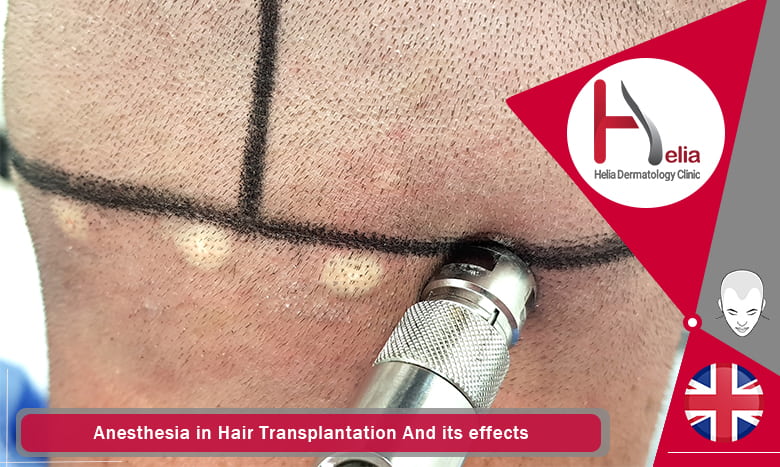
The Effect of Anesthesia on Hair Transplantation Without Bleeding and Pain
As mentioned, the first step before starting a non-surgical natural hair transplant is to apply local anesthesia. In this way, the doctor uses a slight sedative to perform the hair transplant process with the least amount of pain. However, the dose of anesthetic injected into each person will vary according to the physician’s discretion. The patient may feel pain at the time of the local anesthetic injection, which is very small and negligible. Helia Hair and Eyebrow Transplant Clinic has, first of all, thought about the comfort of its clients in this field. Equipped with a needle-free anesthesia machine, you will not experience the slightest pain even at the moment of anesthesia.
Although there are no risks and side effects such as pain and wounds in non-surgical hair transplants, the creation of very small and slight wounds will not be unexpected. So after the anesthetic wears off, you may complain of pain in the scalp. This problem will be solved immediately by prescribing painkillers by a doctor.
How to Reduce the Risk of Bleeding After Natural Hair Transplantation?
Since hair transplantation is a cosmetic procedure, the possibility of bleeding during and after the treatment session will not be unexpected. Of course, the amount of bleeding is completely controllable and if the necessary measures are taken, the amount is very small and can be ignored. In order to avoid the risk of bleeding during the hair implant procedure, you should consider and observe many things before and after it. Among the most effective of these are:
- Refrain from taking specific medications (especially blood thinners) without consulting a doctor for 10 days before and after hair transplantation.
- Refrain from smoking and alcohol for 10 days before and after natural hair transplantation
- Avoid manipulating and debriding wounds
- Avoid strenuous exercise until an expert recommends it.
- Avoid putting pressure on the scalp in the first few days after a natural hair transplant
- Keep your head higher than your body for the first few days
- Modify your diet and eat fruits and vegetables to quickly heal wounds
In addition to all the above, the effect of the doctor’s skill and the method chosen for hair transplantation should not be ignored. Because if the doctor does not have enough skills in this field or uses more invasive methods instead of non-surgical hair transplantation, the formation of deep and painful wounds will not be unexpected.
Is Bleeding After Hair Transplantation Permanent?
If all the principles of work in a reputable clinic and by a specialist doctor are done correctly, hair transplantation will not be associated with very dangerous side effects. One of the most common side effects during and after a treatment session is the possibility of bleeding. As mentioned, the amount of bleeding is completely controllable and with some care, such a problem can be prevented to a large extent. As a result, bleeding after hair transplantation is not permanent and will disappear very quickly after the implantation process.
In this video, hair transplantation without surgery is explained by the specialized consultant of Helia Dermatology Clinic. In general, local anesthesia is used for hair transplantation. In this way, the desired area will be completely anesthetized. As a result, the person does not feel any pain during the treatment session and can resume their daily activities after that. Local anesthesia performed in Helia Dermatologic Clinic is performed for the first time in Iran by Needle-Free injection device. This operation is without the needle and pain and bleeding. In this way, anesthetics are injected under the skin without the needle. As a result, unlike traditional methods, the patient will not feel the slightest amount of pain even for anesthesia. For more information on this topic and the cost of non-surgical hair transplants, you can contact us.
Complications and Possible Risks of Non-Surgical Hair Transplantation
As hair transplantation is a cosmetic procedure, it will have some possible side effects. All side effects can be prevented and treated. To raise awareness of hair transplant candidates, the most common possible complications after non-surgical hair transplantation are listed below:
- Itching and scaling of the scalp, which can be significantly relieved by taking ointments prescribed by a doctor.
- Feeling of swelling and inflammation in the areas of the hair donor and hair transplant, which can be partially prevented and treated by using cold water compresses.
- Possibility of bleeding if you do not follow the care tips before and after the operation
- Feeling of pain in the head area, which will be relieved by taking painkillers.
- Hair loss shock in the third week after hair transplantation, which is a completely natural subject and indicates the success of the treatment process and recovery period.
In general, non-surgical hair transplants have far fewer side effects than invasive methods. Therefore, the person will achieve the desired result with the least inconvenience and in a short time.
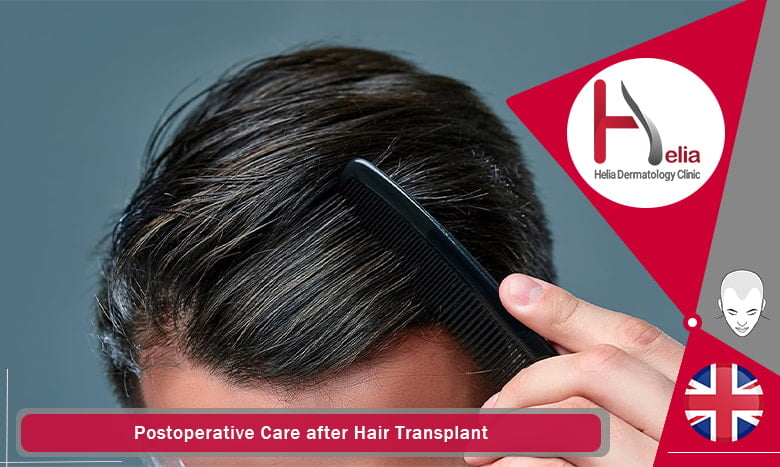
Cosmetic Hair Transplant Postoperative Care
Pre- and post-op care plays an important role in achieving the best results of hair transplant procedures. Because without these cares, the treatment process is incomplete and you cannot expect to achieve thick and high-density hair. For this reason, before leaving the clinic, the doctor will acquaint the natural hair transplant candidates with the care tips. Here are some of the most important ones:
- Keep the hair transplant area away from water and moisture, in the first week to prevent infection
- Keeping the body hydrated by consuming much liquid
- Avoid manipulating and applying pressure to newly implanted follicles
- Avoid exposure to direct sunlight during recovery
- Do not comb your hair in the first three weeks
- Do not smoke or drink alcohol in the first 10 days after hair transplantation
- Refrain from taking any medication without a doctor’s prescription
- Regular use of medications prescribed by your doctor.
By observing all the above, there is no need to worry and you can experience a short recovery period. Of course, achieving the desired result in this transplantation method requires patience because it will take some months to go through all the stages of treatment and see the final results.
cons of hair transplant
While hair transplant surgery can provide natural-looking and long-lasting results for people who suffer from hair loss, there are some potential drawbacks and risks to consider. Here are some cons of hair transplant surgery:
- Cost: Hair transplant surgery can be expensive, and the cost can vary widely depending on the extent of the procedure and the location of the clinic.
- Pain and discomfort: The surgery involves making incisions in the scalp and transplanting hair follicles, which can cause pain and discomfort. Some patients may require pain medication during recovery.
- Scarring: While hair transplant surgery can result in a natural-looking hairline, it can also leave scars on the scalp. These scars may be visible if the hair is cut short or shaved.
- Infection: Like any surgical procedure, there is a risk of infection. Patients may be given antibiotics to prevent infection, but there is still a small risk.
- Potential for poor results: Hair transplant surgery is not a guarantee of success, and there is a chance that the transplanted hair may not grow as expected. In some cases, patients may require additional procedures to achieve the desired results.
- Maintenance: Hair transplant surgery does not stop hair loss from continuing, and patients may need to continue taking medications or undergo additional procedures to maintain the results of the surgery.
- Downtime: Recovery from hair transplant surgery can take several days to a week, during which time patients may need to avoid strenuous activity and wear a special cap to protect the scalp. This downtime can be inconvenient for some people.
Results of Non-Surgical Hair Transplant Surgery
Everyone who chooses non-surgical hair transplantation is looking for positive results that will be achieved in the end. Because this method is associated with minimal side effects and pain and bleeding. As a result, the cost and time allotted for it are quite valuable, and after achieving thick and beautiful hair, self-confidence returns to people. Do not forget that the results of cosmetic hair transplant surgery will be seen some months after it is done and after the completion of the full recovery period. For this reason, you need to have a lot of patience. Every single day in the first three weeks, hair transplant candidates will see improvement in wounds and growth of newly transplanted hair.
But after the third week, the implanted hair suddenly falls out and this stage is called hair loss shock. If you see such an event, there is no need to worry, and on the contrary, this stage shows the recovery process. After the end of the hair loss shock, the hair begins to grow again with a more beautiful appearance and at the right angle. Finally, in 6 to 8 months, you can see the final and desirable result of the work.
How long the recovery period will take for the results of non-surgical hair transplantation to be revealed will depend on various factors, among the most important of which are the hair transplant method, the doctor’s expertise, the standardization of the clinic facilities, the proper observance of pre-and post-op care by the person and his lifestyle and nutrition. Although this process may seem a little long to some people, the results are permanent and will give you lifetime confidence and beauty.
hair transplant durability
Hair transplants are considered to be a permanent solution for hair loss. The transplanted hair follicles are taken from areas of the scalp that are genetically programmed to remain in the growth phase for a lifetime. Therefore, the transplanted hair should last a lifetime.
hair transplant without pain
Hair transplant surgery is generally considered to be a relatively painless procedure. Local anesthesia is used to numb the scalp, and the procedure itself is relatively quick and straightforward. Some patients may experience some minor discomfort during the procedure, but this is usually minimal and can be easily managed with over-the-counter pain medications.
non surgical hair replacement uae
Non-surgical hair replacement is a great option for those looking to restore their hair without the need for surgery. It is a safe and effective way to get back your natural looking hair. In the UAE, there are a number of clinics and salons that offer non-surgical hair replacement services. These services typically involve the use of a hairpiece or wig that is custom-made to match your natural hair color, texture, and style. The hairpiece or wig is then attached to your scalp using a special adhesive or tape. The results are natural-looking and can last for several months.
needle free anesthesia hair transplant
Needle-free anesthesia is not typically used for hair transplant procedures. Hair transplant procedures are typically done with local anesthetic injections to numb the area. This is done to ensure that the patient is comfortable during the procedure.
last word
Hair growing surgery, also known as hair transplantation, is a surgical procedure that involves taking hair follicles from one part of the body and transplanting them to another part of the body. The most common type of hair growing surgery is follicular unit transplantation (FUT), which involves taking a strip of skin from the back or side of the scalp and transplanting the individual hair follicles to areas of the scalp that are thinning or balding. The procedure is usually done under local anesthesia and takes several hours to complete. The transplanted hair will grow naturally and last a lifetime.
You can find out the cost of your hair transplant by visiting “Helia Dermatologic Clinic” and consulting with the experienced specialists of this skin and hair clinic. Call +971 56 100 3040 for consultation.
Also, you can benefit from online consultation through the online chat system of the website.
Hair and eyebrow transplants in this clinic are performed by the prominent doctor of the country, Dr. Hamidreza Khorasani.

